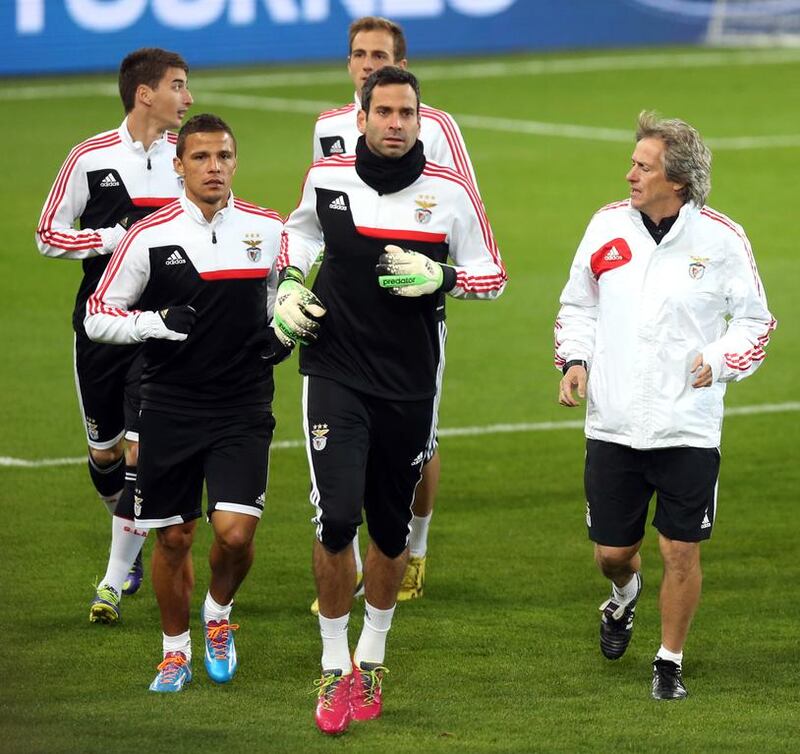Sven Goran Eriksson shook his head regretfully.
The much-travelled Swedish coach was reminiscing about the closest he came to adding a European Cup to his various triumphs in a long career across various countries in Europe. “Baresi,” he sighed, “he was just too good for us that day.”
That was in 1990, when Eriksson took Benfica to a European Cup final. They gave the AC Milan of Franco Baresi, Paolo Maldini, Ruud Gullitt and Marco Van Basten all they could handle, but it would end the same way as Benfica’s previous six continental finals.
With silver medals.
The catalogue was extended again a year ago, with defeat in the Europa League final. Even Eriksson, as famous for his rational, cool approach to management as the current Benfica coach, Jorge Jesus, is known for his vivacious passion, must wonder if the so-called “curse” put on the club might be legitimate.
The curse? It dates back to the early 1960s, when Benfica held the status of Europe’s finest club team. Their coach was the charismatic Bela Guttman, a Hungarian who had signed the great Eusebio, the Mozambican striker, and brought an end to Real Madrid’s early dominance of the nascent European Cup.
After helping Benfica beat Madrid in Amsterdam in the 1962 final to retain the prize, Guttman fell out with his employers over the size of a salary increase he thought his achievements warranted. He was dismissed and reportedly announced on his way out of the job: “Not in a hundred years will Benfica win another European Cup.”
The following season, they led in the final against AC Milan, but lost 2-1. They would reach two more finals in the 1960s, losing both.
Portuguese club football would gradually lose its front-line status over the decades that followed, but Benfica remained competitive and are still among the best-supported clubs in the world, the most popular in their own country and avidly followed in the Portuguese-speaking parts of Africa and Asia.
Mention the Guttman curse as far away as Angola, and benfiquistas know exactly what it means.
Three generations have felt it. Between 1983 and 1990, three European finals were lost. Then there was 2013’s agonising series of collapses at the finishing line.
Leaders of the domestic league for the majority of the season, Benfica stumbled at the last to finish as runners-up to Porto. Finalists in the Portuguese Cup, they lost, startlingly, to underdog Vitoria Guimaraes. Benfica also made it to their first European final in 23 years, in the Europa League, versus Chelsea. After a 1-1 deadlock, extra time beckoned. Then Branislav Ivanovic broke hearts, just as Milan’s Baresi and many others over 50 years had done, converting Chelsea’s winner in injury time.
Three months ago, a statue of Guttman was erected outside Benfica’s Stadio da Luz. Part of the intention, besides honouring the coach who had delivered Benfica their greatest triumphs, was to address the so-called curse, or at least superstitious benfiquistas were encouraged to think in those terms.
It has been a big year of remembrance for Benfica. Not only of Guttman, but of Eusebio, whose statue has pride of place in front of the arena. He died in January. Mario Coluna, a colossus in midfield for the European Cup-winning sides and later the captain of Benfica, passed away in February.
The modern Benfica would never keep hold of players of their calibre as long as they did in the 1960s. The marketplace has changed. Benfica are now, essentially, a selling club, who maintain what standards they can through the canny acquisition of young talent, and their resale.
Jesus, the Benfica coach, knows that is how it must be. Benfica have earned hugely from those transfers, and Jesus’s task is to compensate the losses.
Nemanja Matic was the most recent, moving to Chelsea for €25 million (Dh125.8m); Jesus kept Benfica on course despite the large hole vacated in central midfield. He had them overcome the disappointment of elimination from the group stage of the Champions League, had them hold off sustained pressure from Sporting in the Primeira Liga, which they won with two matchdays to spare.
His job tonight is to cover other absences. Benfica’s Enzo Perez and Salvio are suspended following a feisty semi-final victory over Juventus.
“It’s a 50-50 game,” Jesus told uefa.com, “and really I respect Sevilla.” Benfica respect Jesus, too.
Win tonight and he keeps Benfica, serial silver medallists a year ago, on course for a quadruple, with the league and League Cup won and a Portuguese Cup final to follow tonight’s possible curse-breaker.
sports@thenational.ae
Follow us on Twitter at SprtNationalUAE






